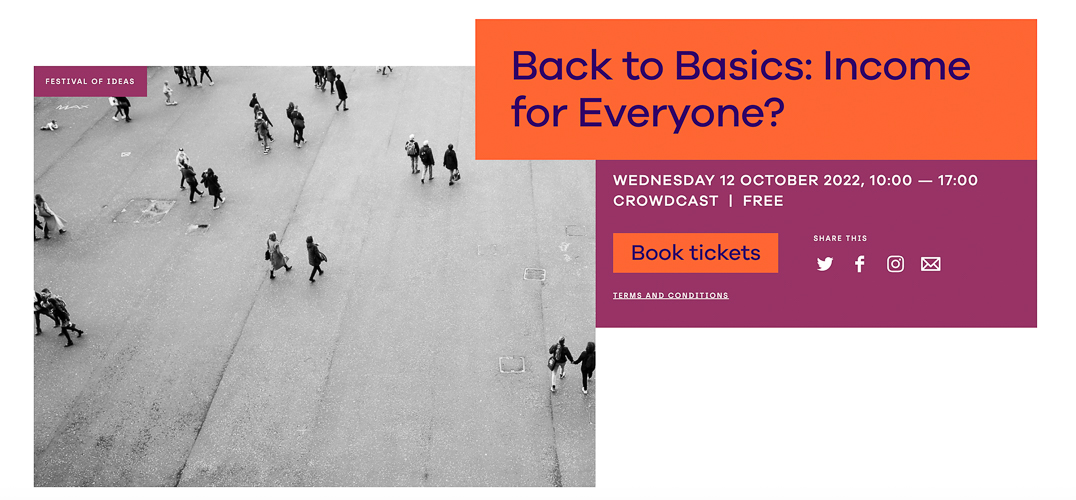
by Kate McFarland | Sep 27, 2017 | Research
The Institute for Policy Research (IPR) at the University of Bath has released a policy brief titled “Assessing the Case for a Universal Basic Income in the UK”.
The 94-page policy brief surveys the rise in popularity of the idea of universal basic income (UBI), especially in the UK context, and examines its feasibility and possible implementation strategies.
The report’s author, IRP Research Associate Luke Martinelli, draws upon his previous microsimulation studies, including “The Fiscal and Distributional Implications of Alternative Universal Basic Income Schemes in the UK” (March 2017) and “Exploring the Distributional and Work Incentive Effects of Plausible Illustrative Basic Income Schemes” (May 2017). He supplements his own work with the simulation analyses of other researchers, including Malcolm Torry (Citizen’s Income Trust) and Howard Reed and Stewart Lansley (Compass) in the UK and Olli Kangas (Kela) in Finland. Martinelli argues that microsimulation techniques, which can be used to model the economic effects of UBI at a national level, allow researchers to address questions about the feasibility and desirability of UBI that are out-of-reach by “real-world” experiment–given that the latter “do not test for the crucial effects of accompanying tax changes, nor examine how changes in income and behavioural responses would be distributed across different demographic groups in the case of a truly universal payment” (p 16).
In Chapter 3 of the policy brief, Martinelli applies these simulation studies to the question of the affordability of UBI. Investigating both full and partial UBI schemes, Martinelli investigates the fiscal implications of the policy for the UK government, taking into account potential adjustments to the existing tax and benefit system, as well as their consequences for poverty and inequality. Overall, Martinelli finds that data “appear to suggest” that “it is possible to design a UBI such that it is both affordable and adequate” (emphasis in original), with the most feasible option being a partial UBI on top of existing means-tested benefits (p 48). However, he issues several notes of caution in interpreting this (apparent) consequence.
One cautionary note concerns the fact that the simulation studies use only static models, which do not provide for possible changes in labor market participation resulting from the introduction of UBI. In Chapter 4, however, Martinelli examines the labor market effects of UBI in detail, again drawing upon simulation studies. Here, he considers the results of studies that model the impact of UBI schemes on financial work incentives, concluding that UBI does significantly improve incentives, especially for low-income groups and recipients of means-tested benefits (although, as the author admits, monetary incentives are “by no means the only factor affecting labour supply decisions,” p 63). In this chapter, Martinelli supplements the simulation analysis with empirical findings from previous experiments on unconditional cash benefits (including, especially, from the negative income tax experiments conducted in Manitoba in the late 1970s). He also reviews a range of theoretical considerations, including the prima facie tension between the positions of UBI supporters who see the policy as a way of incentivizing employment (e.g. as contrasted to means-tested benefit schemes) and those who advocate the policy as providing an “exit option” from employment.
In the final chapter of the policy brief, Martinelli scrutinizes implementational challenges facing UBI in the UK, including complications building political coalitions around the idea. As Martinelli stresses, apparent political consensus around UBI is likely to dissolve when specific policy implementations are issue. In concluding the report, he urges supporters of UBI not to demand a full basic income immediately, but instead to consider an incremental approach. As potential first steps, Martinelli mentioned a small universal payment (“partial basic income”) or a basic income restricted to certain age groups (e.g., as suggested by Malcolm Torry, young adults or adults nearing pension age).
The full report can be downloaded here:
Luke Martinelli, “Assessing the Case for a Universal Basic Income in the UK”, Institute for Policy Research, September 2017.
Reviewed by Russell Ingram
Photo (Bath, England) CC BY-NC-ND 2.0 David McKelvey

by Kate McFarland | Jun 3, 2017 | Research
The Institute for Policy Research (IPR) at the University of Bath published its latest report on the effects of basic income — titled “Exploring the Distributional and Work Incentive Effects of Plausible Illustrative Basic Income Schemes” — on May 18, 2017.
Authored by IPR Research Associate Luke Martinelli, the report builds upon the working paper “The Fiscal and Distributional Implications of Alternative Universal Basic Income Schemes in the UK” (March 2017), in which Martinelli used simulation techniques to model four different types of basic income schemes (varying according to the amount of the benefit and accompanying changes in the tax and benefit system) and their effects on poverty and inequality.
The new report carries out a more detailed analysis of basic income schemes set at the three levels found to be most plausible in the earlier report: the level of the tax saving implied by the UK’s personal income tax allowance (which it would replace); the level of the UK’s existing social assistance benefits (many of which would be replaced); the level of existing benefits plus premiums for the disabled.
In this new contribution, Martinelli examines the predicted impact of these schemes on financial work incentives, including both financial incentives to work at all and incentives to increase work marginally. Martinelli looks in greater detail at the distributional consequences of the basic income schemes, including the effect on women and disabled individuals.
According to Martinelli, “Both of these elements are crucial to efforts to evaluate whether basic income has desirable effects and what types of design features would help make the policy politically feasible. The models we examine in this paper present a number of issues that basic income advocates will have to address as they think about implementation and policy design more closely.”
The report concludes that, with respect to distributional consequences, each scheme results in both winners and losers, stating, “Our core insight is that for the most part, even when particular groups gain (lose) on average, there are usually still non-trivial numbers of individuals and households who are worse off (better off).”
Concerning work incentives, each scheme sees a reduction in financial work incentives for most individuals. However, the distribution of effects was such that “we can imagine the effects of stronger work incentives on particularly sensitive groups to outweigh the more generalised effect of weaker work incentives over the wider population.”
Download the full report from IRP’s website:
“IPR Report: Exploring the Distributional and Work Incentive Effects of Plausible Illustrative Basic Income Schemes” (Institute for Policy Research, University of Bath).
Reviewed by Dawn Howard
Photo: “Rough sleeper” in Taunton, England; CC BY-NC-ND 2.0 Neil Moralee

by Kate McFarland | Dec 11, 2016 | News
Since May 2016, the Institute for Policy Research (IPR) at the University of Bath has been conducting an ongoing project investigating the design, effects, and implementation of different universal basic income proposals for the UK.
The project, Examining the Case for a Basic Income, includes a series of lectures, workshops, and other events. Its most recent event was a public lecture by Citizen’s Income Trust Director Malcolm Torry on the state of the basic income debate.
The next event associated with the project, which will take place on Tuesday, December 13, is an academic-oriented workshop led by IPR Research Associate Luke Martinelli and Visiting Policy Fellow Jurgen De Wispelaere (also Visiting Research Fellow at the University of Tampere). The goal of Tuesday’s workshop, Basic Income and the European Welfare State, is to “situate the feasibility and institutional ‘fit’ of different basic income schemes within the literatures of the comparative welfare state and comparative social policy”.
Taking as a starting point that European welfare states face common and diverse challenges (in terms of labour market, demographic and social changes that lead to new profiles of poverty and insecurity, for example), the aim of the session will be to consider the ways in which these challenges present both opportunities and difficulties for basic income as a policy solution, how these vary from country to country, and how different ‘varieties’ of basic income arise when we consider the political and institutional feasibility of schemes in specific contexts.
In addition to a presentation by Martinelli and De Wispelaere, the event will feature a talk by BIEN Co-Chair Louise Haagh (University of York), entitled “Basic Income, Welfare States and Institutional Change: Insights from Europe”, and a roundtable discussion highlighting the different perspectives on welfare state from five different countries. Roundtable participants include Haagh, representing Denmark; Fran Bennet (University of Oxford), representing the UK; Loek Groot (University of Utrecht), representing the Netherlands; Pertti Koistinen (University of Tampere), representing Finland; Jose A. Noguera (Autonomous University of Barcelona), representing Spain.
Each session will include a period of open discussion with the audience, which is expected to consist of academics with research interests or expertise in comparative welfare states.
Details about the Basic Income and the European Welfare State workshop are available here: https://www.bath.ac.uk/ipr/events/news-0264.html.
The IPR’s Examining the Case for a Basic Income project is planning more events for the future, as well as a release of papers for public distribution in spring 2017.
Photo CC BY-NC 2.0 Shawn Harquail

by Peter Knight | Jun 20, 2024 | Events, News
Panel 9 Universal basic income and the future of social policy in the global south
[Interpretation into English and Portuguese, No Spanish]
Venue: Fausto Castilho
Moderator: Leandro Ferreira, Head of Brazilian Basic Income
Network
Speakers:
- Eduardo Suplicy, State Deputy of São Paulo for the
Workers’ Party, PT, Brazil
- Jurgen De Wispelaere, Institute for Policy Research,
Univeristy of Bath (UK) and Basic Income Earth Network
(BIEN)
- Leticia Bartholo, Secretary of Evaluation, Information
Management and Single Registry of the Ministry of Social
Development and Assistance, Family, and Fight Against
Hunger
- Nikhil Dey, Founder Member and Full-Time Activist –
MKSS, India
- Eduardo Zanatta, City councilman, Workers Party [PT],
Brazil
- Eduardo Moreira, Founder of ICL new
To learn more about the Festival of Ideas, click here.

by Peter Knight | Oct 5, 2022 | Events, News
Leading thinkers, politicians and policymakers come together to debate and explore basic income pilots, macro-economic models, the prospects for basic income in developing economies, and political economy of social and economic change.
Join Bristol Ideas for ‘Back to Basics: Income for Everyone?’ – the third conference from the University of Bath Institute for Policy Research (IPR) and Bristol Ideas, supported by the Basic Income Forum.
In recent years, interest in basic income has grown around the world. Basic income is an unconditional income paid to every individual. It is a payment that is not means-tested or made conditional on work-status. Advocates of basic income argue that it represents a fair, simple and efficient way of supporting individuals, in contrast to the complexity and intrusiveness of existing welfare states. Many also argue that automation and the rise of precarious work makes a basic income necessary to replace or supplement wage labour.
The Covid-19 pandemic and cost of living crisis has thrown these issues into sharp relief, as governments around the world have scrambled to close gaps in social safety nets and prevent people falling into poverty. At the same time, treasuries and central banks have mobilized the full range of fiscal and monetary policies to prevent today’s crises tipping economies into deep recessions. State intervention in the economy has expanded, while ideological support for austerity has sharply receded. Arguments about whether a basic income is affordable are being made in a dramatically changed intellectual and political context.
Read more here.






